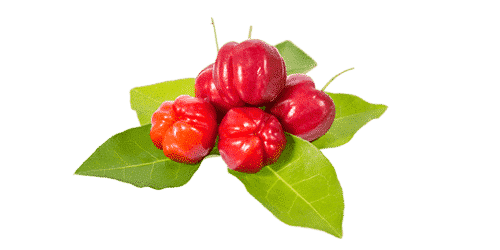
Origin
The acerola fruit is a small cherry which originates from central America, naturally rich in vitamin C. The name comes from “maple cherry” or “table cherry”. At the time, acerola was used in Amazonian tribes to combat digestive problems and liver problems. Today, the fruit is also called “Barbados cherry”.
Did you know?
In the 16th century, Spanish explorers, who gave it the name acerola, discovered the detoxifying benefits of the fruit.
Characteristics
The acerola is a wild shrub with shiny pointed leaves that can be between 5 to15 metres in height. It has pink flowers that bear small red fruits with stones that resemble cherries. The fruit is very juicy and acidic.
Flowering and harvesting
Acerola is cultivated in South America, particularly in Brazil, Peru and in Venezuela. It was then exported around the world. It’s a tropical shrub, which means that it needs heat as well as humidity. The acerola flowers bloom approximately 3 times per year. The fruit emerges a few days after flowering. However, the fruits deteriorate very quickly once picked from the tree. As a result, it is important to refrigerate or freeze the fruit immediately after picking to retain its vitamin C content. This fruit is used in phytotherapy.
Benefits
It was in the middle of the twentieth century that the acerola fruit began to attract interest in the field of phytotherapy. It was discovered that the fruit has a very high vitamin C content, as well as proteins and lipids.
The acerola fruit:
- Helps to combat temporary tiredness
The high vitamin C content of the acerola fruit allows it to help in the combat against temporary tiredness. The fruit is a real energy booster. Vitamin C also strengthens the body’s natural defences.
- Limits the effects of ageing
The vitamin C contained in the acerola fruit is also known for its antioxidant benefits. It will help the body to combat free radicals known for causing the premature ageing of the cells, thereby limiting the effects of ageing on the body.
https://ciqual.anses.fr/#/aliments/13404/cerise-acerola-pulpe-crue-prelevee-a-la-martinique
Plant-based health: 200 plants with health benefits Reader’s Digest selection, 2003. 352 p. ISBN 2-7098-1413-7
